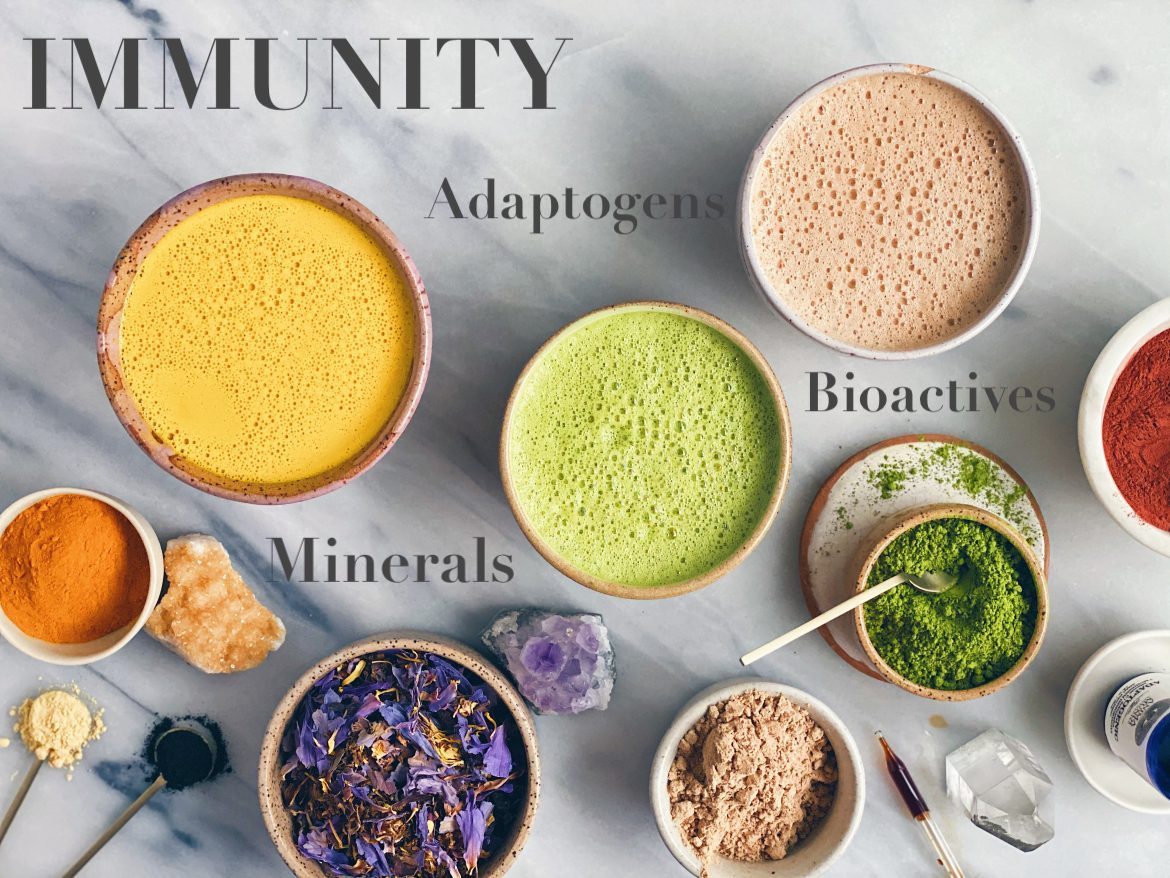By Raphaelle O’CONNOR
Throughout this period of time where we are all dealing with the Coronavirus pandemic globally, I thought it would be a good time to write this article and share my thoughts on how we can best support our immunity levels in general through sources such as bioactives, natural ingredients and primarily, adaptogens.
We cannot boost our immune systems, only support a healthy one…
A healthy immune system means that our bodies have a stronger chance of fighting off viruses and infections. While viruses such as the Coronavirus will not be able to be stopped merely by healthy immune systems, we can see that weaker immune systems have a part to play in that the people who are most affected like the elderly and those with underlying or existing medical conditions. Their immune systems are generally weaker because of their condition or age and are not as effective at fighting off a virus or infection.
There are two main types of immune system response: innate immunity and adaptive immunity. Innate immunity refers to our body’s first line of defence against pathogens whose main purpose is to immediately prevent the spread of said pathogens across the body. Adaptive immunity would be the second line of defence in the fight against non-self pathogens.
A common myth is that we can ‘boost’ our immune systems. As scientists, we know that is not technically true but what we can do is support and reinforce a good, healthy immune function through the intake of the right amount of vitamins and minerals. For example, a Vitamin C deficiency may make us more susceptible to respiratory infections so while we should ensure not to become deficient, taking in extra Vitamin C will not necessarily “boost” our immune system as the body will get rid of excess anyway.
The table below illustrates an overview of the key vitamins and minerals which contribute to an overall healthy immune system.

The most important thing for our immune systems in order to stay healthy is to be able to recognise the antigens that enter it. Antigens are substances that can cause an immune system response, either for better or for worse.
There has been a growing number of foods and beverages on the market in recent years that have sought to incorporate ingredients which support a healthy immune function. It is definitely an area of interest for food and beverage manufacturers to consider when creating products aiming to attract consumer insight as health, wellness and beauty-from-within are such strong purchase drivers at the moment. One of these ingredients has been the Sambucus Nigra (also known as the Elderberry) which boasts strong antioxidant and “flu-fighting” properties. Many functional beverages over the years have been incorporating this ingredient into their recipes because of it’s powerful properties.
Following this idea, I agree that we can support a healthy immune function by increasing our intake of natural ingredients, adaptogens and innate bioactives. Consumers are increasingly seeking natural ingredients to relieve their symptoms of stress, especially over synthetically produced treatments.
With reference to bioactives, I go into further detail about them in my most recent blog here. There are many specific health benefits to be found in certain food products that include bioactives and there is research surrounding the benefits of bioactives in supporting the immune system.
Some examples of foods containing bioactives are the genipap fruit which is a tropical fruit found in South America. It is a major source of minerals as well as other bioactive compounds for the human diet. A name we may know closer to home which is also a powerful bioactive is Curcumin. You have likely seen it in your local health food store and in supermarkets as it is a naturally-occurring element of the spice, turmeric. [4]
Additionally, adaptogens…
…are generally plant-derived biologically active substances that help to increase the body’s resistance against physical, biological, emotional and environmental stressors in a nonspecific manner through maintenance of internal homeostasis. [1]
Saponins are the active component of some adaptogenic plants, such as ginseng which we will look at briefly below. Saponins have pharmaceutical properties, such as hemolytic, anti-inflammatory, antifungal, antiparasitic, and antitumor properties, and the ability to increase immune responses.
Our immune system becomes less able to fight off dangerous pathogens when we become stressed, which leaves us more susceptible to infections and viruses. [1] Some adaptogens can help to overcome stress and stress-related problems. Plant adaptogens are endowed with compounds that increase the ability of an organism to adapt to environmental factors and to avoid damage from such factors by increasing non-specific resistance against stressors, thereby improving one’s ability to adapt to stress. [2]
With the above in mind, let’s look at a few different adaptogenic plants and their immunology responses:
Ginseng: the incorporation of adaptogens into our diet has been proven to reinforce our immunity and defence mechanisms. An example of such in a recent study showed that ginseng has been successful in strengthening the immune system. It is one of the most studied plant materials endowed with adaptogen properties and it has been extensively used as an ingredient in dietary and functional supplements [2].
The Reishi Mushroom (ganoderma lucidum) is another example of an immunity and defence enhancing adaptogen would be the reishi mushroom . Adaptogens work as immune stimulants by enhancing resistance to pathogens, viruses and bacteria, hence the reason why we should look to incorporate these in our diets more often.
Ampelozizyphus Amazonicus Ducke is a medicinal plant used in the Amazon region to prepare a drink with tonic, immunomodulatory and adaptogenic properties. Studies using the spray-dried powder showed that the plant could promote an overall augmentation of the immunological response and act as an adaptogen. [2]
The table below demonstrates a non-exhaustive list of more plants with adaptogenic properties to give you an idea of the quantity of potential adaptogens that exist for us to consider in food and beverage formulations and reformulations.

Functionality finds food
Given the current demand for alternative sources of foods with suitable functional characteristics, the adaptogen effect could be an interesting attribute to consider in determining the use of certain plants in the formulation of foods and beverages.
I believe there is a strong demand for functional foods and drinks in our modern food and beverage industry, mainly thanks to popular convenience and on-the-go trends which force consumers to search for suitable, functional foods to fight deficiencies and maintain a healthy and nutritious diet. Advocating the power of these natural ingredients, bioactives and adaptogens used in your food or beverage product through your messaging and marketing is a great way to build a stronger relationship and connection with like-minded consumers.
iNewtrition can help you design products like this for your customer base, send an email to info@inewtrition.com with a bit of information about your (existing or pending) products and I am happy to have a chat about next steps for you. If you need immediate feedback, please book a consultation and we can set-up a call within 24 hours.
REFERENCES
[1] Mandeep Kumar Singh, Garima Jain, Bhrigu Kumar Das, Umesh K Patil. 2017. Biomolecules from Plants as an Adaptogen.
[2] Tatiana Jotha Mattos Simen, Priscilla Vanessa Finotelli, Fernanda Ferreira Barboza et al. 2015. Spray-dried extract from the Amazonian adaptogenic plant Ampelozizyphus amazonicus Ducke (Saracura-mirá): Chemical composition and immunomodulatory properties.
[3] Alexander Panossian, 2017. Understanding adaptogenic activity: specificity of the pharmacological action of adaptogens and other phytochemicals.
[4] José L. Martinez, Amner Muñoz-Acevedo, Mahendra Rai, 2019. Ethnobotany: Application of Medicinal Plants.




No comments! Be the first commenter?